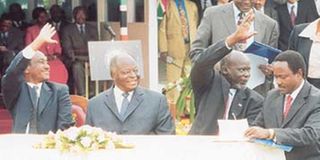Youth in diaspora adopt wait-and-see attitude

President Mwai Kibaki looks on as First Vice-President of Sudan, Mr Ali Osman Taha (left), and Dr John Garang, chairman of the Sudan People's Liberation Movement, wave to their countrymen during the launch of the final phase of the Sudan peace process at State House in Nairobi yesterday.
As many South Sudanese people welcome total independence from the Arab-dominated North, thousands of youth from South Sudan still remain in the Diaspora. Most of them have great dreams and hope for their motherland.
The majority of the youth, both in South Sudan and the Diaspora - Uganda or Ethiopia- were either child soldiers or left the country when they were toddlers.
Most of the ex-child soldiers still have the bitter memories of how they were recruited to join the army while they were barely teenagers. The explosions of the machine-guns and grenades are still fresh in their ears.
Images of fellow child soldiers who died in the war and women raped as they watched are still vivid in their minds’ eye. That is why most have vowed to reclaim and help rebuild the country they gave their all.
One Lam Tungwar Kueigwong, a UN-Habitat Messenger of Truth, a musician and a youth leader currently living in Juba, is not ready to let go his country ever again. Now aged 26 years, he was recruited to join the war at the tender age of seven years.
“I was told that I was going to study in Ethiopia, where my older cousins had gone. Little did I know that I was being recruited for military training to fight the regime in Khartoum ,” he recalls.
After fighting for about five years, he finally made it to the Kenya/Sudan border, where he and others just like him surrendered their weapons to enter the Kakuma Refugee Camp.
He later made it to Nairobi, where he traced some of his relatives who had fled to Kenya earlier and enrolled in a primary school.
“We are now educated and know what is happening around us, and we are not ready to let our beloved country go back into the hands of the Northers,” says Lam, a graduate of Africa Nazarene University and currently the chairman of the Southern Sudanese Artistes Association.
Another ex-child soldier, John Kuduop, is urging youth to come back home and help in re-building the nation. As a youth leader with the Government of South Sudan (GOSS), Kuduop believes that only youth can save their nation.
“I’m not happy with youth who are not back home.
They might be studying, or working abroad, but the thing is that they should come back home and use their skills to rebuild this nation,” he says.
Josephine Abalang, now in her late 20s and currently working with the Government of South Sudan (GOSS), recalls how she walked at night from Juba to the neighbouring Uganda while a small girl during the civil war. She was lucky to get a scholarship to Canada, where she studied up to the Masters level. She is also urging youth to come back home and help rebuild the country.
Manase Mathiang in mid twenties, currently living in Nairobi, was never a child soldier but recalls his family hosting many refugees from South Sudan.
Manase, in solidarity with the South Sudanese musicians based in Kenya, is currently running a door-to-door campaign within the South Sudanese communities living in Kenya urging them to go back and help rebuild their country.
Emmanuel Jal, another ex-child soldier and an internationally-renown artiste, is currently in London, asking South Sudanese people to maintain peace.
Although most South Sudanese youth are all for an independent South, the question is still whether they are ready and willing to go back home or remain in the Diaspora.
Most of the organizations the South Sudanese youth are running, are registered either in Kenya, Uganda or Ethiopia. The South Sudanese Artistes Association (SSAA), which runs the annual Miss Malaika New Sudan Beauty Pageant, is registered in Kenya..
Junub Sudan Sports Association, which has been doing lots of football tournaments in Nairobi and other parts of the country, is registered in Kenya. According to its executive director, Pabek Alec, it is still not clear if they will shift their entire operations to South Sudan.
“What I know is that we will have a branch in Juba, but the Nairobi office will still be operational.
According to Manase, it will take about five years for the South Sudanese youth to go back home. “I visit Juba on a regular basis, but I think it will take another five years for the systems to start running smoothly, and that’s when the youth will fly home to roost,” he says.




